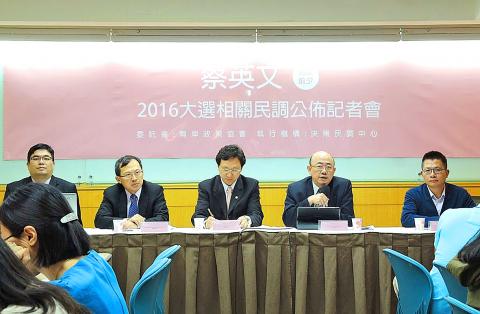Prior to Democratic Progressive Party Chairperson Tsai Ing-wen’s (蔡英文) trip to the US today, a survey released yesterday showed that 66.1 percent of Taiwanese believe that her policy of maintaining the “status quo” in cross-strait relations corresponds to the US’ cross-strait policy.
The poll released by the Cross-Strait Policy Association showed that only 13.2 percent of respondents held the opposite view.
Cross-Strait Policy Association president Tung Chen-yuan (童振源) said he expected the US would want Tsai to clarify her views on her “maintaining the status quo” remarks and to know how she would go about doing so.

Photo: CNA
The poll showed that 37.1 percent of respondents believe that her trip would not affect her presidential campaign, while 32.3 percent said it would.
The poll was conducted on Monday and Tuesday, with 1,171 valid samples from people randomly selected from telephone books.
The poll found that Tsai led over all her potential Chinese Nationalist Party (KMT) rivals, even in northern Taiwan — notably Taipei, New Taipei City and Keelung — which have traditionally been a stronghold for the pan-blue camp.
Whether against KMT Chairman Eric Chu (朱立倫) or Legislative Speaker Wang Jin-pyng (王金平), Tsai would win by a large margin, even in the north, the poll showed.
Facing Chu, Tsai would have 57.1 percent support over Chu’s 33.8 percent nationwide, while 14.2 percent of respondents said they were undecided. Against Wang, Tsai had the support of 51.3 percent of respondents nationwide, while Wang had 31.7 percent of the support, with 16.8 percent of the respondents saying they are still undecided, the poll found.
Breaking down the figures geographically, even in Taipei, New Taipei City and Keelung, Tsai garnered the support of 57.4 percent of respondents against Wang’s 28.4 percent; and when running against Chu — who is serving his second term as New Taipei City mayor — Tsai still has 52.1 percent of support against Chu’s 36.3 percent in the three cities, the poll found.
Jet-Go Consulting Group (戰國策顧問) chairman Wu Chun-cheng (吳春城) said the poll might indicate people are tired of the KMT.
“When Tsai first announced her presidential bid [last month], a poll conducted without identifying her rival showed that she only had a little over 30 percent support,” Wu said. “However, if you compare Tsai against other KMT rvials, she immediately has more than 50 percent support.”
“This shows that the 20 percent growth might come from people who simply do not like the KMT,” he said.

The Taiwanese passport ranked 33rd in a global listing of passports by convenience this month, rising three places from last month’s ranking, but matching its position in January last year. The Henley Passport Index, an international ranking of passports by the number of designations its holder can travel to without a visa, showed that the Taiwan passport enables holders to travel to 139 countries and territories without a visa. Singapore’s passport was ranked the most powerful with visa-free access to 192 destinations out of 227, according to the index published on Tuesday by UK-based migration investment consultancy firm Henley and Partners. Japan’s and

NATIONAL SECURITY THREAT: An official said that Guan Guan’s comments had gone beyond the threshold of free speech, as she advocated for the destruction of the ROC China-born media influencer Guan Guan’s (關關) residency permit has been revoked for repeatedly posting pro-China content that threatens national security, the National Immigration Agency said yesterday. Guan Guan has said many controversial things in her videos posted to Douyin (抖音), including “the red flag will soon be painted all over Taiwan” and “Taiwan is an inseparable part of China,” while expressing hope for expedited “reunification.” The agency received multiple reports alleging that Guan Guan had advocated for armed reunification last year. After investigating, the agency last month issued a notice requiring her to appear and account for her actions. Guan Guan appeared as required,

Japan and the Philippines yesterday signed a defense pact that would allow the tax-free provision of ammunition, fuel, food and other necessities when their forces stage joint training to boost deterrence against China’s growing aggression in the region and to bolster their preparation for natural disasters. Japan has faced increasing political, trade and security tensions with China, which was angered by Japanese Prime Minister Sanae Takaichi’s remark that a Chinese attack on Taiwan would be a survival-threatening situation for Japan, triggering a military response. Japan and the Philippines have also had separate territorial conflicts with Beijing in the East and South China

A strong cold air mass is expected to arrive tonight, bringing a change in weather and a drop in temperature, the Central Weather Administration (CWA) said. The coldest time would be early on Thursday morning, with temperatures in some areas dipping as low as 8°C, it said. Daytime highs yesterday were 22°C to 24°C in northern and eastern Taiwan, and about 25°C to 28°C in the central and southern regions, it said. However, nighttime lows would dip to about 15°C to 16°C in central and northern Taiwan as well as the northeast, and 17°C to 19°C elsewhere, it said. Tropical Storm Nokaen, currently